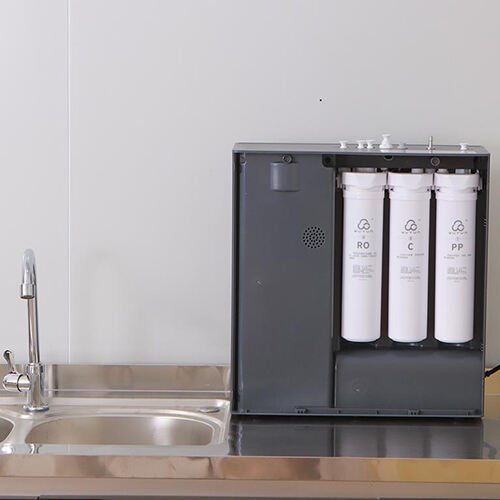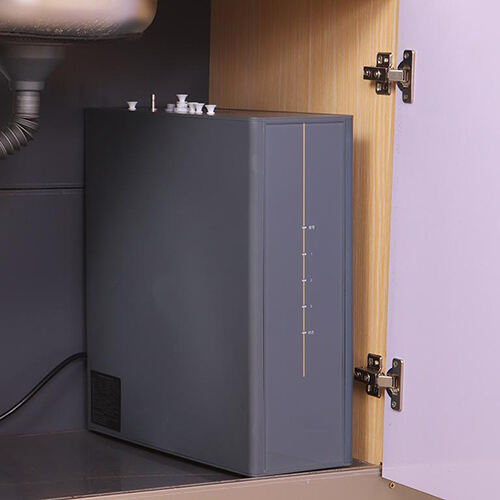Чистата пиеща вода е основна за човешкото здраве. Всъщност, обаче, в много части на света достъпът до безопасна пиеща вода е luxe, а не дадено. Загадителите, замърсяващите вещества и патогените могат да компрометират качеството на водата, което представлява сериозна заплаха за здравето. Практично и ефективно решение на тази глобална предизвикателство е използването на водни очистители. Тази статия ще обясни по тези причини как водните очистители са необходими, за да открием как продвинатата филтрирана премахва загадителите и премахва ефектите на очистяването върху здравето и благосъстоянието.
Как да премахнем продвинати загадители при филтрирането?
Современните филтри за очистка на вода използват продължителни технологии за филтриране, предназначени да премахват ефективно нечистоти от водата. Тези системи обикновено интегрират няколко стадии на филтрирането, насочени към всяка конкретна група от замърсители, за да се осигури широкомаштабна очистка.
Филтър за активен въглерод
Филтри с активен въглерод са често срещани компоненти в уредите за очистка на вода. Те работят чрез абсорбция, при която замърсителите се хванат към повърхността на въглеродните частици. Този процес успешно премахва хlorин, летучи органични сложни (VOCs) и лоши миризи, което значително подобрява вкуса и миризмата на водата.

Обратен осмозис (RO)
Обратната осмоза е много ефективен метод за филтриране, при който водата се принуждава да минава през полу-проницаема мембрана, оставяйки замърсителите зад себе си. Тази техника може да премахне широка палитра от замърсители, включително тежки метали като свинец, ртут и арсен, микроби и различни химикали. Системите RO са особено ценни поради способността си да очистяват водата до високо ниво на защита.
Ултравиолетова (UV) очистка
УФ очистка включва използването на ултравиолетови лъчи за разрушаване на бактерии, вируси и други патогени във вода. УФ лъчите проникват в клетките на тези микроби, нарушават техната ДНК и ефективно ги нейтрализират. Този метод е безхимичен и не променя вкуса или качеството на водата, което го прави екологично приязен вариант за защита срещу биологични загадители.
Ультрафилтриране (UF)
Ультрафилтрирането използва мембрана с много малки пори, за да задържат частici, бактерии и патогени, позволявайки на водата и разтворими минерали да минават. УФ е по-специално ефективно за премахване на частици, които са прекалено малки за традиционните филтри, но са достатъчно големи за мембраните на ОБ, което го прави балансиран подход към както химикали, така и микроби.
Влияние на очистката върху здравето и благосъстоянието
Достъп до чиста вода е не само удобство, а важен фактор за поддържане на общото здраве и благополучие. Последствията от употребата на замърсена вода могат да бъдат тежки, от непосредствени болести до продължителни здравни проблеми.
Превенция на водни болести
Водните болести, като холера, дисентерия и гиардиазис, се причиняват от патогении в замърсената вода. Тези болести могат да доведат до тежка дехидратация, малкохранение и дори смърт. Очистването на водата премахва ефективно тези патогении, което значително намалява случващите се такива болести. В райони, където достъпът до чиста вода е ограничен, въвеждането на уреди за очистване на вода може да спаси животи.

Смяна на химическа експозиция
Тежките метали и химикали, често непо желание, могат да имат сериозни здравни последици с течението на времето без правилното тестване. Например, оловото може да причинява развитични проблеми у децата и неврологични проблеми у възрастните. Експозицията към ртуть е свързана с повреди на нервната система, храносмилателната система и имунната система. Чрез използването на филтри за очистка на вода, индивидите могат да намалят тези рискове и да се защитят от хронични здравни проблеми, свързани с химически замърсители.
Повишени вкус и миризма
Освен здравните предимства, чистата вода просто има по-добър вкус и миризма. Много от замърсителите, намерени в водата, като хлор и сульфурни съединения, могат да оставят неприятен вкус и миризма. Премахването на тези вещества чрез филтриране насърчава висока консумация на вода, която е необходима за поддържане на хидратацията и общото здраве.
По-добро качество на живот
Когато хората имат достъп до чиста, безопасна пиеща вода, това може значително да подобри качеството на техния ежедневен живот. Те са по-малко вероятни да заболяват, по-вероятно да останат увлачени и могат да се фокусират върху други основни аспекти на живота като образование, работа и семейство. За общностите, особено в развиващи се страни, това може да означава подобрение на икономическата и социалната стабилност.
Екологични ползи
Използването на домашния водоподготовител също намалява зависимиостта от бутилкирана вода, което има значителни екологични предимства. Бутилкираната вода допринася за пластмасовия отпадък, който е голям екологичен замърсител. Като очистват собствената си вода, хората могат да намалят потреблението на пластмаса и да намалят своята углеродна следа.
Накрая, уредите за очистка на вода играят незаменима роля при осигуряването на безопасна пиеща вода, като премахват замърсителите ефективно чрез напредни филтриращи технологии. Влиянието им върху здравето и благосъстоянието е дълбоко – от предотвратяване на болести до повишаване на качеството на живота. Насочването средства към системи за очистка на вода е инвестиция в здравето, продължителността на живота и околната среда. Безопасната пиеща вода не е само изискване; тя е основно човешко право, което помага да се поддържа чистите уреди за очистка на вода.
Съдържание
- Как да премахнем продвинати загадители при филтрирането?
- Филтър за активен въглерод
- Обратен осмозис (RO)
- Ултравиолетова (UV) очистка
- Ультрафилтриране (UF)
- Влияние на очистката върху здравето и благосъстоянието
- Превенция на водни болести
- Смяна на химическа експозиция
- Повишени вкус и миризма
- По-добро качество на живот
- Екологични ползи

 EN
EN
 AR
AR
 BG
BG
 HR
HR
 CS
CS
 DA
DA
 NL
NL
 FI
FI
 FR
FR
 DE
DE
 EL
EL
 HI
HI
 IT
IT
 JA
JA
 KO
KO
 NO
NO
 PL
PL
 PT
PT
 RO
RO
 RU
RU
 ES
ES
 SV
SV
 TL
TL
 IW
IW
 ID
ID
 UK
UK
 VI
VI
 HU
HU
 TH
TH
 TR
TR
 FA
FA
 AF
AF
 MS
MS
 GA
GA
 AZ
AZ
 KA
KA
 BS
BS
 KK
KK
 KY
KY